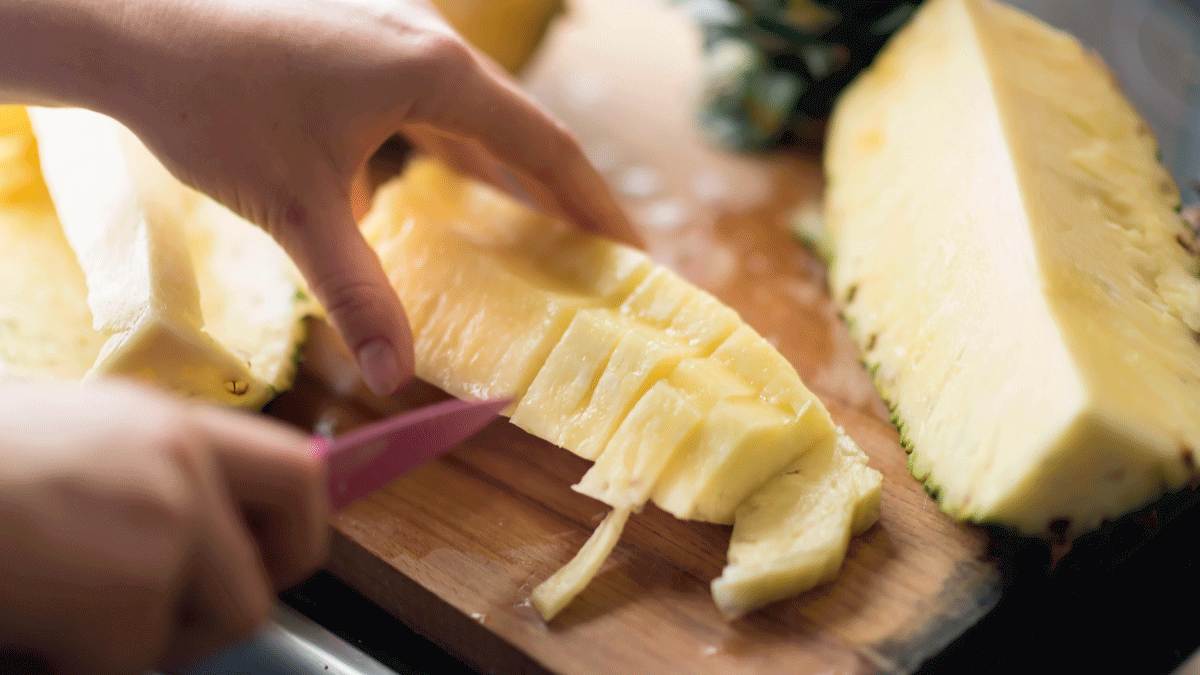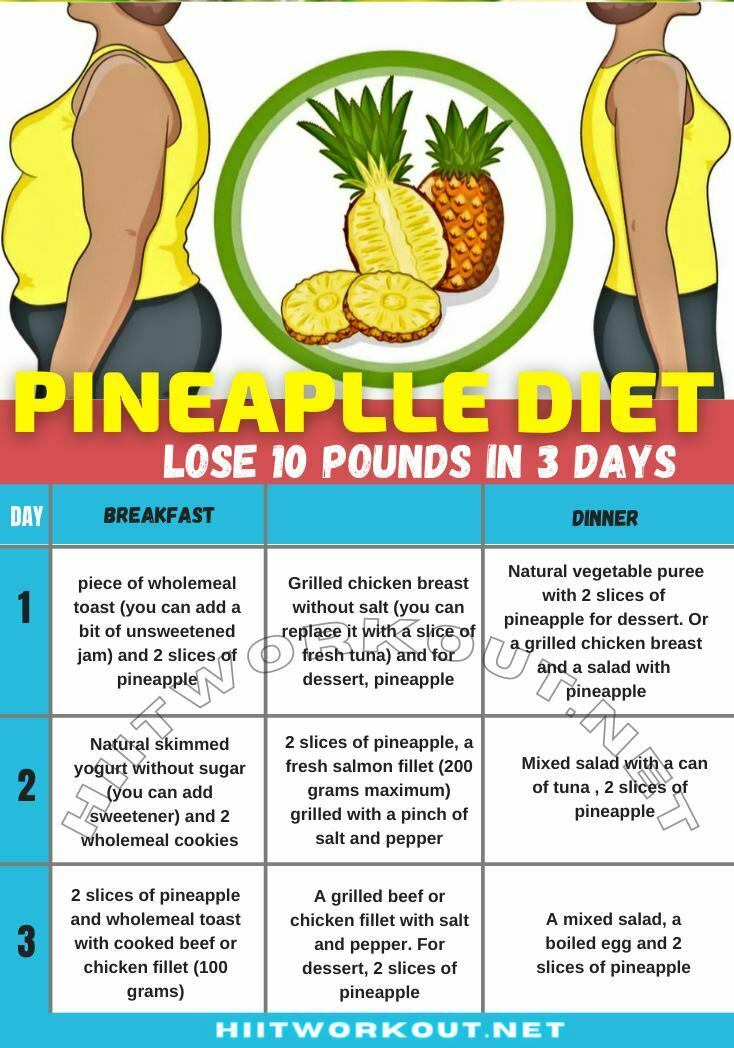The Pineapple Diet has been making waves in the health and wellness community. This diet plan centers around the tropical fruit, pineapple, known for its tangy sweetness.
Pineapples are not just delicious, they’re packed with essential nutrients. They’re rich in vitamin C, low in calories, and contain an enzyme called bromelain, which aids digestion.
But can a diet focused primarily on this fruit lead to weight loss and improved health?
In this comprehensive guide, we’ll delve into the Pineapple Diet, its potential benefits, and how to incorporate it into your lifestyle.
Remember, while pineapples offer numerous health benefits, a balanced diet is key to overall well-being.
What is the Pineapple Diet?
The Pineapple Diet is a weight loss plan that emphasizes the consumption of pineapples.
This diet is based on the idea that pineapples, being low in calories and high in fiber, can promote feelings of fullness. This can potentially lead to a reduced calorie intake and weight loss.
However, the Pineapple Diet is not just about eating pineapples. It’s about incorporating this tropical fruit into a balanced diet.
Here’s a basic rundown of what the Pineapple Diet might look like:
- Breakfast: A bowl of fresh pineapple chunks
- Mid-morning snack: A glass of pineapple juice
- Lunch: A salad with pineapple and lean protein (like chicken or tofu)
- Afternoon snack: A pineapple smoothie
- Dinner: A balanced meal with a side of pineapple
Remember, this is just a sample plan. The actual diet may vary based on individual needs and preferences.
It’s also important to note that the Pineapple Diet is not a long-term solution. It’s a short-term diet plan that should be approached with caution. Always consult with a healthcare provider before starting any new diet regimen.
Nutritional Profile of Pineapples
Pineapples are not just delicious, they are also packed with essential nutrients.
They are rich in vitamin C, a powerful antioxidant that is essential for immune system function. A single cup of pineapple chunks provides more than 100% of the recommended daily intake of vitamin C.
Pineapples also provide a good amount of manganese, a mineral that is important for bone health and metabolism. Other vitamins and minerals found in pineapples include thiamin (vitamin B1), vitamin B6, copper, and folate.
Here’s a more detailed look at the nutritional profile of pineapples:
- Calories: 82
- Protein: 0.54 grams
- Fat: 0.12 grams
- Carbohydrates: 21.65 grams
- Fiber: 2.3 grams
- Sugar: 16.25 grams
- Vitamin C: 78.9 milligrams
- Manganese: 1.53 milligrams
- Copper: 0.181 milligrams
- Vitamin B6: 0.112 milligrams
- Folate: 18 micrograms
In addition to these nutrients, pineapples also contain a unique enzyme called bromelain. This enzyme has been studied for its potential anti-inflammatory and digestive benefits.
Overall, the nutritional profile of pineapples makes them a healthy addition to any diet. However, like any food, they should be consumed in moderation as part of a balanced diet.
Potential Health Benefits of Pineapples
Pineapples are more than just a tasty tropical fruit. They offer a range of health benefits due to their rich nutritional profile.
One of the key benefits of pineapples is their high vitamin C content. This vitamin is a powerful antioxidant that can help protect the body from damage by free radicals.
Pineapples also contain a unique enzyme called bromelain. This enzyme has been studied for its potential anti-inflammatory and digestive benefits.
Moreover, the fiber content in pineapples can help promote feelings of fullness, which can be beneficial for weight management.
Here are some potential health benefits of pineapples:
- Boosts immune function
- Aids digestion
- Reduces inflammation
- Promotes feelings of fullness
- Provides antioxidants
Vitamin C and Immune Function
Vitamin C is a powerful antioxidant that plays a crucial role in maintaining a healthy immune system.
Pineapples are an excellent source of this essential vitamin. A single cup of pineapple chunks provides more than 100% of the recommended daily intake of vitamin C.
Digestive Health and Bromelain
Pineapples contain a unique enzyme called bromelain. This enzyme has been studied for its potential to aid digestion and reduce inflammation.
Bromelain can help break down proteins, which can aid in digestion. It also has anti-inflammatory properties that may benefit individuals with conditions like arthritis.
Metabolism and Weight Loss
Pineapples can be a beneficial addition to a weight loss diet. They are low in calories and high in fiber, which can promote feelings of fullness.
Moreover, the bromelain in pineapples may have a thermogenic effect, potentially boosting metabolism and aiding in weight loss. However, more research is needed to fully understand this potential benefit.
The 3-Day Pineapple Diet Menu
The Pineapple Diet is a short-term diet plan that emphasizes the consumption of pineapples. It’s important to note that this diet should not replace a balanced meal plan.
The diet typically involves eating pineapple as a primary food source for a set period. This could range from a few days to a week.
While on the Pineapple Diet, it’s essential to drink plenty of water to stay hydrated. The diet may also be complemented with other protein sources to maintain muscle mass.
Here are some steps to implement the Pineapple Diet:
Day 1
- Breakfast: 2 slices of whole-grain toast with 2 tablespoons of peanut butter and 1 cup of pineapple chunks.
- Snack: 1 cup of pineapple chunks.
- Lunch: Grilled chicken breast with a side of steamed vegetables and 1 cup of pineapple chunks.
- Snack: 1 cup of pineapple chunks.
- Dinner: Baked fish with a side of quinoa and 1 cup of pineapple chunks.
Day 2
- Breakfast: 1 cup of Greek yogurt with 1 cup of pineapple chunks.
- Snack: 1 cup of pineapple chunks.
- Lunch: Turkey and cheese wrap with a side of fruit salad (pineapple, strawberries, and blueberries).
- Snack: 1 cup of pineapple chunks.
- Dinner: Shrimp stir-fry with vegetables and 1 cup of pineapple chunks.
Day 3
- Breakfast: 1 cup of oatmeal with 1 cup of pineapple chunks.
- Snack: 1 cup of pineapple chunks.
- Lunch: Tuna salad with a side of whole-grain crackers and 1 cup of pineapple chunks.
- Snack: 1 cup of pineapple chunks.
- Dinner: Grilled pork chops with a side of roasted vegetables and 1 cup of pineapple chunks.
Remember, this is just a sample plan. The Pineapple Diet can be tailored to individual preferences and nutritional needs.
It’s also important to note that the Pineapple Diet is not a long-term solution. It should be followed for a limited time to prevent nutrient deficiencies.
Risks and Considerations
While the Pineapple Diet may offer some benefits, it’s important to consider potential risks. One major concern is nutritional deficiencies. Relying solely on pineapples for nutrition can lead to a lack of essential nutrients.
Pineapples are not a significant source of protein, which is necessary for tissue repair and growth. The diet may also not provide enough calories for active individuals or athletes. Furthermore, the diet may not be appropriate for diabetics or those with sugar sensitivities due to the natural fructose content in pineapples.
Lastly, the Pineapple Diet is a fad diet and should be approached with skepticism regarding its long-term efficacy. Quick weight loss due to low calorie intake may not be sustainable. It’s always recommended to discuss any new diet plan with a healthcare provider before starting.
Alternatives to the Pineapple Diet
If the Pineapple Diet seems too extreme, there are alternatives. One option is to incorporate pineapples into a balanced diet rather than focusing solely on the fruit. This approach allows you to enjoy the benefits of pineapples while also getting a variety of other nutrients.
Diet Green Tea Pineapple Mango and Diet Cran Pineapple
Another alternative is to try diet beverages like diet green tea pineapple mango or diet cran pineapple. These drinks can provide a low-calorie alternative to sugary drinks. They can be enjoyed as part of a balanced diet, offering a tropical twist to your hydration routine.
Incorporating Pineapple into a Balanced Diet
Incorporating pineapples into a balanced diet can contribute to overall health and well-being. Pineapples can be included in salads, smoothies, and other healthy recipes. They can also be a part of a healthy snack rotation, along with other fruits and vegetables. Remember, the key is moderation and variety in your diet.
Conclusion
The Pineapple Diet is a fad diet that emphasizes the consumption of pineapples. While it may lead to quick weight loss due to low calorie intake, it’s not a sustainable or balanced diet. It’s important to remember that while pineapples offer numerous health benefits, they should not be the sole component of your diet.
Final Thoughts on the Pineapple Diet
In conclusion, the Pineapple Diet should be approached with caution. It’s always best to consult with a healthcare provider before starting any new diet plan. A balanced diet, regular exercise, and a healthy lifestyle are the keys to long-term health and well-being. Pineapples can certainly be a part of that, but they shouldn’t be the whole picture.
Keep reading: 3 Day Military Diet to Lose 10 Pounds in 3 Day



